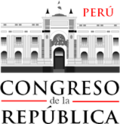This article may need to be rewritten to comply with Wikipedia's quality standards.(August 2024) |
| President of the Congress of the Republic of Peru | |
|---|---|
| Presidencia del Congreso de la República del Perú | |
 Parliamentary Logo | |
| Residence | Legislative Palace |
| Seat | Lima |
| Term length | 1 year, renewable |
| Inaugural holder | Francisco Xavier de Luna Pizarro |
| Formation | 20 September 1822 |
| Succession | Third |
| Deputy | 1st Vice President of Congress 2nd Vice President of Congress 3rd Vice President of Congress |
| Website | congreso.gob.pe |
 |
|---|
President of the Congress of the Republic of Peru is the presiding officer in the Congress of the Republic of Peru. This is a list of representatives that have served as Presidents of the Peruvian legislature. The Constitution of 1993 re-arranged Congress into a unicameral legislature. The President is elected for a one-year term.

